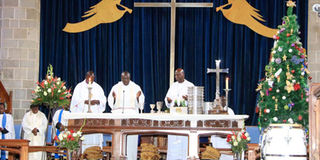City cathedral’s centenary and a legacy of struggle for civil rights

Bishop Jackson ole Sapit (centre) leads Christians at ACK, All Saints Cathedral church in Nairobi on December 25, 2016 during Christmas service. PHOTO | JEFF ANGOTE | NATION MEDIA GROUP
What you need to know:
- The cathedral’s proximity to Uhuru Park made it a natural place of refuge for protesters fleeing police brutality.
- In May 1990, following the brutal demolition of Nairobi's Muoroto informal settlements, the Reverend Peter Njenga, provost of All Saints Cathedral, protested, drawing national attention to this abuse of the poor by the State.
- In July 1997, security forces stormed the cathedral, physically abused and tear-gassed worshippers and activists.
When the history of Kenya’s democratisation is written, the Anglican All Saints Cathedral in the heart of Nairobi, which is now celebrating its centenary, will be part and parcel of that story. In 1963, Kenya got independence from British colonial rule.
A ‘second independence’ in the early 1990s was realised with the return of multiparty politics.
During the Kanu regime, there was limited scope for public discourse. The body politic was rent by surveillance, censorship, abductions, detentions without trial, and other forms of systematic torture by the police.
Clerical leadership at the cathedral provided a strategic platform for national discourse in the democratisation.
The cathedral’s proximity to Uhuru (freedom) Park made it a natural place of refuge for protesters fleeing police brutality. The engagement of clergymen took the form of sermons, publications, the stimulus of critical national debate and the provision of refuge for political activists.
As a member of the National Council of Churches of Kenya, the church was represented on the management boards of influential church-related publications as – Target and Beyond magazine.
FIRST INDIGENOUS PROVOST
In 1971, Henry Okullu, resigned from the position of Editor of Target and Lengo newspapers to become the first indigenous Kenyan provost of the All Saints Cathedral. His sermons were based on the Old Testament books of the prophets, challenging the vices of corruption, land grabbing and ethnic bias in employment and education and detention without trial.
In May 1990, following the brutal demolition of Muoroto informal settlements in Nairobi, the Reverend Peter Njenga, provost of All Saints Cathedral, protested, drawing national attention to this abuse of the poor by the State.
In March 1992, the Moi government forcibly dispersed a group of Kenyan women, who had gathered at Uhuru Park to agitate for the release of their sons, detained as political prisoners. The women regrouped and were offered sanctuary in the cathedral.
Police followed them, occupying the grounds for three days as the women hid in the basement. Archbishop Manasses Kuria protested the police presence, stating that “idlers” were officially barred from the cathedral grounds. The cathedral, according to the archbishop was serving as a “sanctuary for the mothers of political prisoners”.
FORCES STORMED CATHEDRAL
In July 1997, security forces stormed the cathedral, physically abused and tear-gassed worshippers and activists. Pews were bloodied and furniture was destroyed. During a service to cleanse the cathedral, Archbishop David Gitari preached a fiery sermon titled, “The Writing on the Wall” based on the Old Testament book of Daniel, in which he warned the Kanu regime that the time for its demise had come.
The cathedral was not alone in agitating for change. A bit more than a stone’s throw away at St Andrew’s PCEA Church, the Rev Timothy Njoya presented the opening salvo that set the stage for a tumultuous 1990.
In his New Year’s day sermon, he denounced the one-party political systems in Africa, predicting that they were doomed to fall just like in eastern Europe.
His sermon on October 5, 1996 called on the Kanu government to enter into dialogue with its restive citizenry. His sermon, based on the Old Testament book of Habakkuk, was titled: “ God’s Justice Triumphs by Reason Through Faith”.
In February 1997 he was transferred to the Presbyterian Church of East Africa’s Kirimara Presbytery in Nyeri, which he declined on “grounds of conscience”.
As All Saints Cathedral celebrates its centenary, it is important to ponder its rich history, including its remarkable civic responsibility. Clergy and laity across Kenya must recognise the continuing mandate of the church as a space for political discourse of social reconstruction and national integration.
Dr Wandera, an Anglican priest, is a senior lecturer in the Department of Religious Studies, St Paul’s University, Limuru. [email protected]




